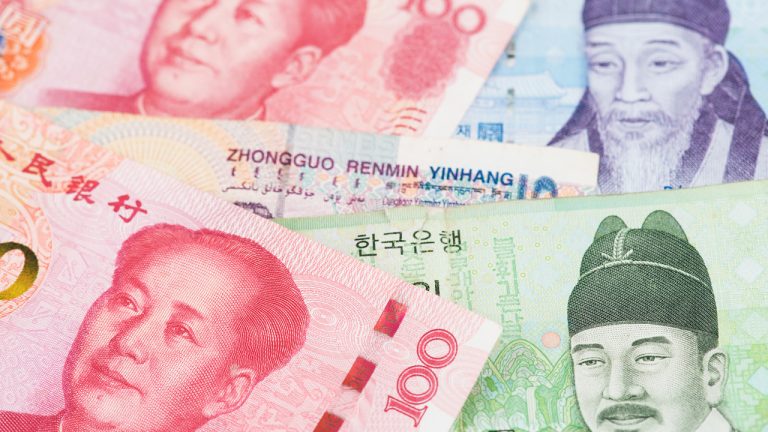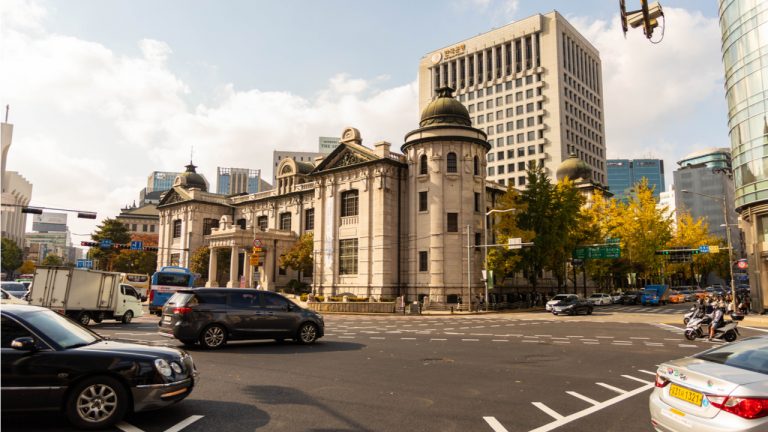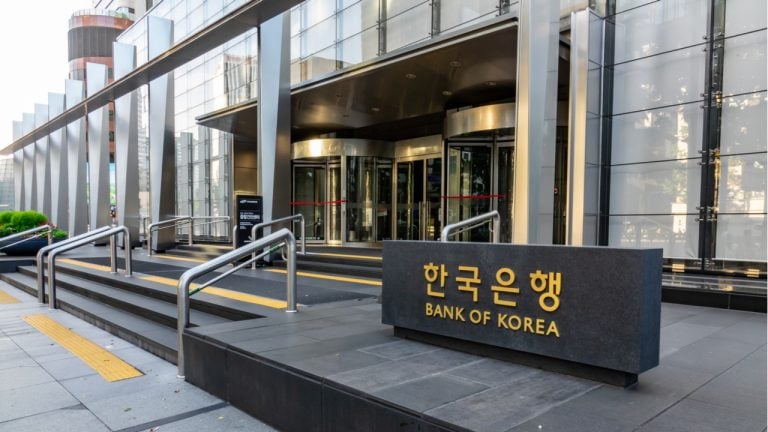 South Korea’s central bank, the Bank of Korea, will soon allow participants to use digital tokens for payments at supermarkets and convenience stores in a central bank digital currency (CBDC) trial. Starting in December, 100,000 participants will be part of this test. Retail partnerships and global initiatives like Project Agora highlight the broader impact of […]
South Korea’s central bank, the Bank of Korea, will soon allow participants to use digital tokens for payments at supermarkets and convenience stores in a central bank digital currency (CBDC) trial. Starting in December, 100,000 participants will be part of this test. Retail partnerships and global initiatives like Project Agora highlight the broader impact of […]
The South Korean central bank will be able to access crypto transaction data from exchanges operating in the country.
The central bank of South Korea has been given the green light to ramp up its scrutiny of cryptocurrency service operators and issuers amid further discussions on virtual asset legislation in the country.
On April 20, local media outlet The Korea Herald reported the Bank of Korea (BoK) will be given the right to investigate operators of cryptocurrency-related businesses.
The South Korean central bank has been competing with the country’s financial regulator, the Financial Services Commission (FSC), over crypto jurisdiction. However, the FSC will have the final say in governing the regulation of the digital asset sector.
The Bank of Korea expressed concerns over financial stability risks from stablecoins and will now be able to request transaction data from crypto exchanges.
The BoK’s right to request data from digital currency operators was confirmed by an official from the National Assembly’s Political Affairs Committee last week. The FSC will express its official position at a subcommittee meeting on April 25.
The meeting will accelerate the rollout of South Korea’s virtual asset laws, according to the report.
Democratic Party lawmaker Kim Han-gyu, who proposed the country’s crypto regulations, the Crypto Assets Act, said “The Financial Services Commission admits that it is necessary for the Bank of Korea to have the right to request data, but it is refusing to include it in the bill.”
The South Korean government has been trying to push forward crypto legislation but there have been arguments between the central bank and the FSC over who should control it.
However, the FSC warned that if the central bank governs crypto it will send the message that digital assets have the same standing as traditional finance. The FSC chair has previously said that he does not consider crypto a financial asset.
The two institutions have been at loggerheads for the past three years over crypto regulations. The FSC has been accused by officials from the Political Affairs Committee, a division of the country’s State Affairs Commission, of trying to monopolize its position as a crypto regulator.
The latest development means that both the South Korean central bank and its financial regulator will be able to investigate crypto operators and have full access to transaction data.
Related: South Korea saw over $4B unregistered crypto transactions in 2022
The FSC has been active recently with enforcement actions against crypto companies and takes the same position as the United States Securities and Exchange Commission (SEC) in that it considers crypto assets securities.
South Korea’s Financial Supervisory Service, which operates under the FSC, announced an investigative body called the Digital Assets Committee in mid-2022.
Asia Express: 3AC cooks up a storm, Bitcoin miner surges 360%, Bruce Lee NFTs dive
 The South Korean central bank is set to be granted the right to investigate virtual assets after the Financial Services Commission (FSC) dropped its opposition to the move. According to a report, the FSC dropped its opposition to the central bank’s bid after it was accused of seeking to make itself the country’s sole regulator […]
The South Korean central bank is set to be granted the right to investigate virtual assets after the Financial Services Commission (FSC) dropped its opposition to the move. According to a report, the FSC dropped its opposition to the central bank’s bid after it was accused of seeking to make itself the country’s sole regulator […] A newly-released study published in December 2022 reveals that South Korea’s “kimchi premium,” the divergence in cryptocurrency valuations on Korean exchanges compared to Western trading platforms, is strongly associated with a surge in international remittances to China. Examination of Overseas Remittances to China Uncovers Strong Correlation with South Korea’s ‘Kimchi Premium’ According to a study […]
A newly-released study published in December 2022 reveals that South Korea’s “kimchi premium,” the divergence in cryptocurrency valuations on Korean exchanges compared to Western trading platforms, is strongly associated with a surge in international remittances to China. Examination of Overseas Remittances to China Uncovers Strong Correlation with South Korea’s ‘Kimchi Premium’ According to a study […]
The CEO of NFT marketplace Magic Eden said NFT creators “need a sustained revenue model” and with “no way” of currently enforcing royalties a “new asset class” could emerge to enforce them.
Jack Lu, the CEO of Solana-based nonfungible token (NFT) marketplace Magic Eden has floated the idea of NFTs designed to enforce royalties.
Lu said in an address at Solana’s Breakpoint 2022 conference on Nov. 5 that these NFTs could “give rise to a new asset class” as the space grapples with the debate around opt-in royalties.
He added that “creators need a sustained revenue model” and while royalties were one of those models there is “no way” to enforce them with the “current design” but added there are “many new innovations that could be made available to them.”
Lu noted that over the past months, Magic Eden had spoken to “dozens, if not 100” NFT creators across differing NFT use case and that they found their needs “actually are very, very divergent.”
“There is a real opportunity to give rise to a new asset class, and this asset class will have special properties but also have special trade-offs. So it could enforce royalties at a technological high technological level.”
Those “trade-offs” would mean NFT creators would have “some level of control” Lu explained but added in the talks Magic Eden had with creators and holders that they were “willing to accept some of these trade-offs” in order to ensure that they could bring their business models to fruition.
According to Lu, Magic Eden is set to launch an asset “next week” that can enforce royalties in partnership with Cardinal, a protocol enabling NFT conditional ownership and the privacy-oriented browser Brave.

The Bank of Korea (BOK) — South Korea’s central bank — has reportedly tested buying NFTs with its Central Bank Digital Currency (CBDC) according to a Nov. 7 report from Yonhap News.
The BOK said it had completed a simulation and research project carried out over the past ten months since Aug. 2021, creating a simulated environment for its CBDC using distributed ledger technology (DLT).
The project tested the usual functions needed for a digital currency, including issuing, transacting and remittances using the digital won, while the report also noted that “the process of purchasing NFTs with CBDCs was also implemented.”
It’s reported that this process was done through the simulated environment and a “digital asset system” built using differing DLT platforms with smart contract functionality, without going into further detail.
The BOK also tested the possibility of applying Zero Knowledge Proofs (ZKPs) to strengthen the protection of personal information. ZKP protocols can be used for forms of digital identities with some iterations using NFTs as a digital ID solution, although it's unknown if the NFTs transacted in the project were related to digital identities.
South Korea has stated its plan to allow its citizens access to blockchain-powered digital IDs in 2024 that could be used in finance, healthcare, taxes, and transportation.
An NFT project by Animoca Brands in conjunction with its subsidiary TinyTap has seen six NFTs featuring a children’s educational course sell at auction for a total of around 138 Ether (ETH) — around $228,000, Animoca said on Nov. 7.
The project was created as a way for educators to create content and receive a share of revenues when their course is purchased and used by learners according to Animoca.
The six teachers who created the courses were given a 50% cut of thes sale of the NFT, generating them around $111,000 in ETH, while the teachers will also receive a 10% ongoing share of revenue by their course.

Animoca calls the NFTs “Publisher NFTs” with each representing co-publishing rights to a course — which is a bundle of education-based games on a specific subject created by a teacher.
The NFT owner is expected to promote their course and share the revenue and is entitled to keep up to 80% of future revenue generated by their own marketing and publishing of the course.
Rolex isn’t wasting any time gearing up to launch a Web3 play with trademark filings showing the luxury watch brand is ready to tick over into the Metaverse.
The United States Patent and Trademark Office (USPTO) filings shared by trademark attorney Mike Kondoudis on Twitter show Rolex is ticking off a list of crypto and NFT-related trademarks to protect its brand across virtual realms.
Luxury watchmaker #ROLEX has filed a trademark application claiming plans for:
— Mike Kondoudis (@KondoudisLaw) November 7, 2022
⌚️ NFTs + NFT-backed media + NFT marketplaces
⌚️ Crypto keys and transactions
⌚️ Virtual goods auctions
⌚️ Virtual and cryptocurrency exchange + transfer#NFTs #Metaverse #Crypto #Web3 #Perpetual pic.twitter.com/J8C93Qcybj
The filings suggest Rolex wants to offer NFTs, crypto wallets, crypto transactions and hints at a potential metaverse as it wishes to provide an “online space for buyers and sellers” and hold “virtual interactive auctions” although time will tell what type of online space Rolex may build.
Companies are showing a big appetite for trademark applications as crypto, Web3, and related filings have soared in 2022, reaching 4,708 at the end of October compared to the 3,547 filed in all of 2021.
Related: NFTs still in ‘great demand’ as unique traders rise 18% in Oct: DappRadar
The Chinese city of Wuhan, the epicenter of the COVID-19 breakout, has reportedly axed its NFT plans aimed to boost its economy ruined by the pandemic amid increasing regulatory uncertainty on crypto and Web3 technologies in the country.
 Samsung, the Korean tech giant, has decided to participate in a central bank digital currency (CBDC) program that is being carried out by the Bank of Korea. The company will be testing the feasibility of using these new instruments in its lineup of Galaxy phones, specifically assessing the possibility of making offline payments between peers. […]
Samsung, the Korean tech giant, has decided to participate in a central bank digital currency (CBDC) program that is being carried out by the Bank of Korea. The company will be testing the feasibility of using these new instruments in its lineup of Galaxy phones, specifically assessing the possibility of making offline payments between peers. […] South Korea’s monetary policy regulator is taking steps to create its own digital coin. Bank of Korea is now looking for a technology provider to develop a test environment for the project. The news comes after major commercial banks expressed skepticism over their cooperation with domestic cryptocurrency exchanges. Central Bank of Korea to Launch Pilot […]
South Korea’s monetary policy regulator is taking steps to create its own digital coin. Bank of Korea is now looking for a technology provider to develop a test environment for the project. The news comes after major commercial banks expressed skepticism over their cooperation with domestic cryptocurrency exchanges. Central Bank of Korea to Launch Pilot […] South Korea’s monetary policy regulator, Bank of Korea, plans to obtain documents from financial institutions to track crypto transactions involving bank accounts. Cryptocurrency prices fluctuate independently from the real economy, the bank says, adding that market growth could pose a risk to the country’s financial system. South Korean Central Bank to Intensify Screening of Crypto-Related […]
South Korea’s monetary policy regulator, Bank of Korea, plans to obtain documents from financial institutions to track crypto transactions involving bank accounts. Cryptocurrency prices fluctuate independently from the real economy, the bank says, adding that market growth could pose a risk to the country’s financial system. South Korean Central Bank to Intensify Screening of Crypto-Related […]
South Korea’s central bank is the latest entity seeking powers to monitor crypto trading activity in the country.
The Bank of Korea reportedly has plans to maintain strict oversight on crypto trading activity via real-name bank accounts.
According to a report by The Korea Herald on Thursday, the BOK is seeking authority under Article 87 of the country’s central bank Act, stating: “We plan to utilize our legal authority over requesting document submittal from financial institutions to monitor the volume of cryptocurrency transactions made through bank accounts.”
The above comments are reportedly from documents submitted by the BOK to lawmakers in the country with the central bank wary of unlawful crypto transactions causing significant risks to internal monetary control policies.
According to a BOK official, the central bank’s crypto monitoring regime could begin in September if approved by lawmakers.
The BOK’s request for powers to police crypto trading volume activity comes on the heels of financial regulators in the country demanding a full audit of banks that deal with cryptocurrency exchange clients.
As previously reported by Cointelegraph, authorities in South Korea are keen to ensure the complete implementation of the mandatory real-name crypto trading account policy. Indeed, only the “big four” crypto exchanges — Bithumb, Upbit, Korbit, and Coinone — are reportedly adhering to the policy.
Both the Financial Services Commission and the Financial Intelligence Unit are keeping a watchful eye on South Korea’s crypto market. The FSC has even asked its employees to declare their cryptocurrency holdings.
Crypto service providers including exchanges, custodians, wallet platforms, and asset managers, have until September to begin complying with new financial reporting requirements. Companies that fail to adhere to the ruling could see their executives face up to five years in jail.
Despite the tightening of crypto regulations, demand continues to skyrocket in South Korea. Traders are reportedly favoring altcoins with Bitcoin (BTC) volume declining on several exchanges.
South Korea will also introduce a 20% capital gains tax on crypto trading profits above 2.5 million won ($2,230) beginning in January 2022.